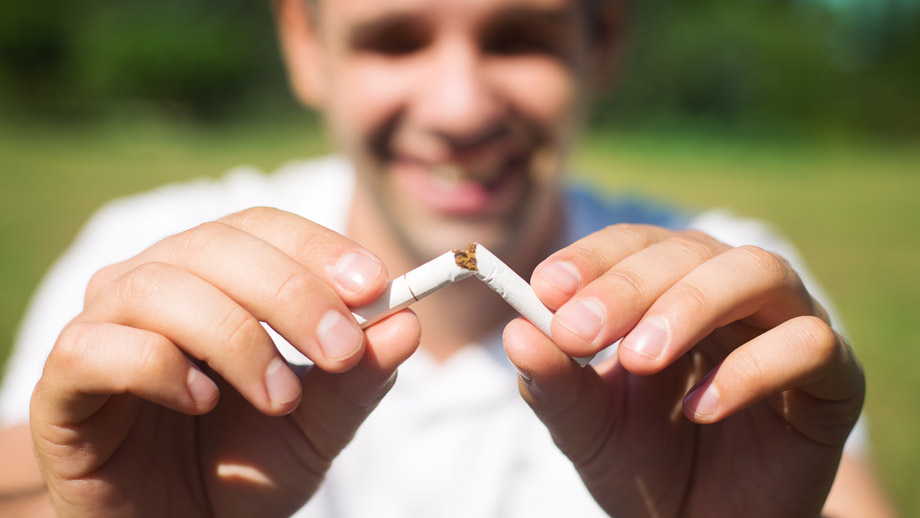
What Happens When You Stop Smoking?
The journey to stop smoking can sometimes feel difficult, especially when you experience those intense nicotine withdrawals. But the benefits you experience when you stop smoking are so worth it—and you’ll start to feel better just 20 minutes after putting your last cigarette down. From saving money, to lowering your risk of serious illness, deciding to stop smoking can have positive effects throughout many areas of your life.
If you’re looking for a little help on your quitting journey, Nicorette Coated Nicotine Lozenges have your back every step of the way! The National Cancer Institute recommends nicotine gum and lozenges as a treatment to help you kick cigarettes to the curb.2 An FDA-approved coated lozenge, Nicorette lozenges help with those nicotine withdrawal symptoms that may start up after you decide to quit, by providing lasting craving relief even after they dissolve.
Once you finally make the leap to living a smoke-free life, you’ll have a lot of things to look forward to. Discover the positive answers to the question of what happens when you stop smoking.
When You Stop Smoking...
Your heart rate and blood pressure decrease
Both your heart rate and blood pressure decrease just 20 minutes after you stop using cigarettes.1 Cigarette smoking leads to an acute raise in a person’s blood pressure and heart rate, and may increase the risk of unpleasant cardiovascular events.5 According to research, a high heart rate may be associated with cardiovascular disease, and high blood pressure may lead to heart disease, kidney damage, and even stroke.5 Deciding to stop smoking may help you avoid serious illnesses down the line.
You'll save money
In 2023, the average cost of a pack of cigarettes in the United States is $8.00, ranging from $6.11 in Missouri to $11.96 in New York.6 This means if you smoke one pack a day, you may be spending roughly between $42 and $83 per week. If you ditch the cigarettes, you can save up and afford things that you find enjoyment in — such as a dream vacation, or an item of clothing that you’ve had your eye on.
You'll breathe more easily
Within months after you stop smoking, you may notice that you are coughing less and experiencing less shortness of breath.1 This is because during this time, cilia, the small hair-like structures that are in charge of moving the mucus out of your lungs, begin to start working properly again.4
You'll be able to spend more time with friends and family
Many public areas, such as eateries, malls, and outdoor parks, don’t allow smoking, which means you may have been on your own to find a space where smoking is allowed. When you stop smoking, you don’t have to worry about leaving friends or family to go to a designated smoking section. In addition, those around you may not enjoy the smell of cigarette smoke — so by quitting smoking, you’ll have more time around those that you love!
Your risk of smoking-related illnesses drops
After quitting, your risk of having a heart attack drops significantly, and after five years, your risk of developing cancers of the mouth, bladder, and throat is halved.1 Staying smoke-free may not always feel easy, but when you look at all the ways it can benefit your daily life, it’s a no brainer!
What Happens to Your Body When You Quit Smoking
20 Minutes After
According to the American Cancer Society, after putting down your last cigarette, your heart rate and blood pressure drop to healthier levels after just 20 minutes.1
12-24 Hours After
A few days after quitting, the carbon monoxide levels in your blood will be back down to normal and your risk of experiencing a heart attack is significantly reduced.7
After 2 Days
Symptoms of nicotine withdrawal will start to peak the first couple of days after quitting and last a few weeks.8 You may feel tense and anxious with a tight feeling in the muscles in your neck and shoulders within 24 hours after quitting.8 This anxiety may build for a few days and persist for a few weeks while your body craves nicotine.8 Keep Nicorette Gum or Nicorette’s new Coated Ice Mint Lozenges on hand to give yourself some relief from cravings. Your sense of taste and smell may be beginning to improve at this point, so treat yourself to something delicious, or go buy yourself a nice candle or perfume to celebrate— you’ve taken a huge healthy step in the right direction, and you deserve a little pampering. Especially if it keeps you on track!
After 2 Weeks
This is when your circulation and lung function begin to improve; this process may last two weeks to three months after quitting.3
After 1 Month
If smoking left you feeling fatigued and short of breath, this may start to turn around at the one-month mark.1 Additionally, the little fibers in your lungs’ bronchial tubes, called cilia, begin to regrow at this one-month milestone, which may help your body clean your lungs and reduce infection.1,4 The presence of cilia indicate increased lung functionality; your lungs are now better equipped to handle mucus, keep your lungs free of debris, and lessen the risk of infection.4
After 6 Months
You’ve overcome a massive hurdle — half a year! — so be sure to celebrate this impressive milestone. After six smoke free months, the stiffness in your large arteries should have improved, marking cardiovascular progress.9 Those who have quit smoking for six months may experience marked improvement in psychological well-being, cognitive function, energy levels, and quality of sleep.10
After 1 Year
Your risk of heart disease is now half of what it was a year ago, and the risk of having a heart attack has also dramatically dropped.1 With a healthier heart and healthier lungs, you may notice that not only does everyday movements in your daily life feel easier, but you’ll also crush it in your workouts, too.
Keeping a strong support system throughout your journey is important! Consider Quit.com, a website full of insight and information to help you stay strong, as well as a customizable email program that provides support for every step of the way.



